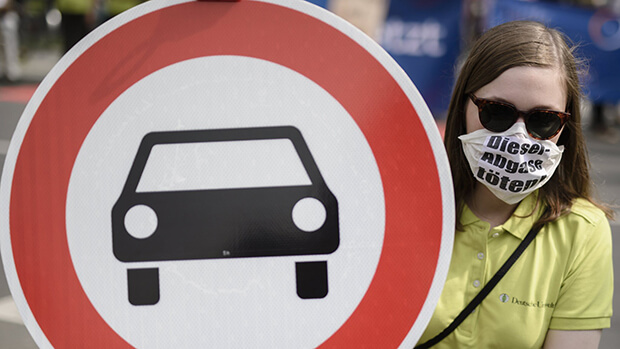The Diesel Wars - New study finds diesel cars are ‘more polluting’ than thought

The latest round of tit-for-tat exchanges between pro and anti-diesel campaigns, one campaign group blames EU rules for favouring the diesel fuel over petrol.
Experts are now saying that the newest diesel-engine cars are actually dirtier than previously thought.
This data is coming from a new study that calls into question why European regulators continue to favour diesel over petrol engines.
Transport & Environment, a Brussels-based organisation lobbying for sustainable transport, has found that a typical diesel car emits 42.65 tonnes of carbon dioxide over its lifecycle or 3.65 tonnes more than a petrol car. T&E said:
“This analysis debunks carmakers’ claim that diesel cars are needed to meet their climate targets,”
“Diesel cars are not only more polluting” in terms of air pollutants including harmful nitrogen oxides and particulate matter, “but also churn out more CO2 and cost on average €2,000 to €3,000 more than petrol”.
The sale of diesel cars has been decreasing in Europe since US regulators exposed the decade-long Volkswagen diesel emissions scandal two years ago.
All the negative press surround diesel emissions are likely to reduce diesel’s share of the European Union car registrations from about half to less than one-third by 2020, according to JP Morgan.
On the other hand, diesel car manufacturers are fighting for diesel’s reputation so as to maintain their share of the car markets.
The Daimler chief executive and president of the European Automobile Manufacturers’ Association, Dieter Zetsche, said last week.
“The latest generation of diesel vehicles is a very effective lever to achieve climate goals in the near future because they emit 15-20 per cent less CO2 than equivalent petrol vehicles,”
Many environmentalists maintain that Europe should stop pouring money and energy into a global niche 20th-century technology. The T&E study shows that diesel only emit less CO2 when regulators narrowly look at tailpipe emissions but they should be taking into consideration the entire lifecycle analysis.
This type of analysis will take into account a wider view of emissions comprising the production of the car, including the sourcing of fuel and materials used in its manufacturing, plus the car’s usage and the recycling of its components.
When this type of analysis is done, investigators have discovered that Diesel cars are far more polluting than petrol cars over their entire lifecycle mainly because of three reasons:
- One, diesel fuel undergoes a more intensive refinery process.
- Two, diesel combusts at a higher temperature than petrol, so the components used are heavier and more robust.
- Three, diesel fuel is cheaper, leading to increased usage on the road.
Ust taking tailpipe emission alone, manager of clean vehicles and air quality at T&E, Julia Poliscanova, who is the main author of the report, said that petrol engines have reduced carbon emissions so much in the past decade that the advantage of diesel engines is almost nil and any gains made previously have been cancelled out. She said:
“In the 1990s, diesel probably was a better choice, but today it is just not the case,”
“They don’t deserve a revival. Today we simply have much better alternatives, in hybrids and electrics.”
BMW and Daimler reviewed the findings of the study but did not offer any comment. Volkswagen said that “several studies” in the past have shown that diesel cars emit less CO2 than a petrol equivalent over their complete lifetime.
“Our own analysis documented that recent comparison of diesel and gasoline cars with similar mileage, performance and other important car attributes are leading to the same conclusion: diesel cars do have a relevant advantage of CO2 emissions over lifetime,”
Volkswagen said. T&E, which represents 50 organisations from 26 countries across Europe, reserves most of its blame not for carmakers but for the “biased regulations and taxes” responsible for “bloated sales of diesel cars in Europe”.
European taxes on diesel are far less than petrol taxes, “making it 10 to 40 per cent cheaper at the pump”. The UK is the only country in the EU that does not have a “diesel bonus” like that. France and Belgium have recently said that they too will close the gap.
T&E calls for the next iteration of European emissions standards to be “technology neutral”. It asks for regulations favouring heavier vehicles to be scrapped and says “fair fuel and vehicle taxes” should be introduced based on real-world carbon emissions.
“It is time Europe stopped pouring money and energy into a globally niche 20th century technology,” the report said.
(As always, if you or a family member are considering buying a used car, don’t buy until you run a car check report with MyVehicle.ie where you will find out the true history of the vehicle.)

Author

Justin Kavanagh
Justin Kavanagh is a recognised leader
in automotive intelligence and vehicle
data supply to the entire motor industry.
He has almost 20 years experience in
building systems from the ground up.
As the Managing Director of Vehicle
Management System, he understands the
need and importance of trustworthy and
reliable vehicle history and advice to
both the trade and the public.
Follow me on LinkedIn